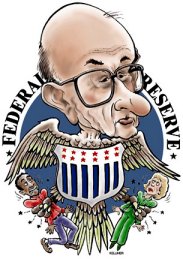 Meet the Dream
Meet the Dream
Stealer
 Contents
Contents |
Next 
|
|
 |
Alan Greenspan comes across very
low key. Even in his expensive, tailored suits, he seems pleasantly rumpled
-- like a forgetful professor or everybody's favorite uncle. He is, in
fact, a high-power political player, with roots in a fiercely conservative
brand of anti-union, anti-worker economics.
Born in New York City in 1926, Greenspan earned his Bachelor's
and Master's degrees in economics at NYU. He worked toward a Doctorate
in economics at Columbia before leaving for a full-time job at the National
Industrial Conference Board, a leading association of business executives.
In his 20s and 30s, Greenspan was invited into Ayn Rand's
inner circle and attended weekly discussion groups in her New York apartment.
Rand, author of The Fountainhead, preached a fire-and-brimstone
philosophy of pure, free market capitalism: no-holds-barred competition,
she insisted, sorts the fit from the unfit; the deserving from the undeserving;
the foolish from the wise. Any "interference" in the markets -- by government,
trade unions or anyone else -- is a social poison to be resisted and purged.
In the 1950s, Greenspan formed the Townsend-Greenspan
consulting company, attracting such big-name clients as Alcoa, Owens Corning
and U.S. Steel.
"There was an absolute rule at Townsend-Greenspan," recalls
Lowell Wiltbank, a fellow Rand-ite who worked at the company. "No communication
that came out of the firm should ever be interpreted to advocate any expansion
of government interference in the economy. If we advocated anything in
terms of government policy, it was deregulation."
By 1968, Greenspan had moved to the center stage of national
politics, serving as Richard Nixon's coordinator of domestic policy research
during his successful presidential campaign. Nixon subsequently appointed
Greenspan Chairman of the Council of Economic Advisers, a position he continued
to hold under Republican President Gerald Ford.
Greenspan advised Ronald Reagan during the 1980 presidential
race, after which Reagan appointed him to chair a special commission on
Social Security.
In 1987, Reagan named Greenspan Chairman of the Federal
Reserve Board, where he has continued to serve through a series of Republican
and Democratic administrations.
|